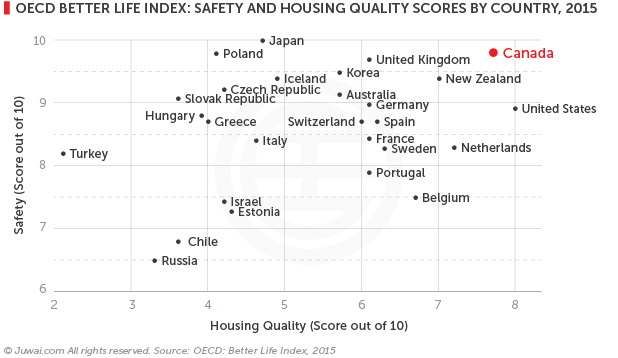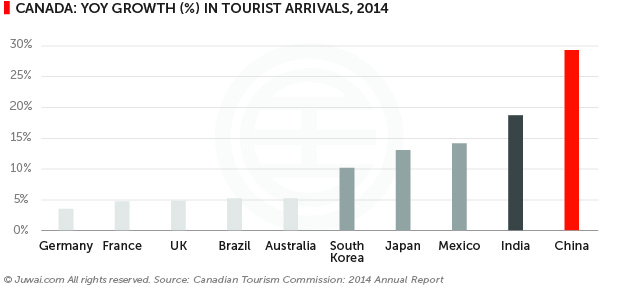You've successfully copied this link.
What drives Chinese buyers to Canada?

What do 350,710 Chinese have in common? They all call Canada home, that’s what.
Between 2004 and 2014, these 350,710 Chinese migrated from China to Canada as permanent residents, according to the Canadian Magazine of Immigration.1
But what explains Canada’s appeal? We delve into what lies behind Canada’s multi-dimensional appeal to China’s fast-growing market of internationally-minded real estate investors.
Visa options remain attractive
While recent headlines on the Canadian government’s new EB-5 rules2 may give the impression of an crackdown on immigration from China, government statements and market realities suggest a different situation.
EB-5 rules have gotten tougher as the government has become more circumspect about who invests in the country, but Canada is still projecting (and preparing for) an increased amount of migrants in 2015 – 285,000, to be precise, compared with approximately 260,000 in 2014.3
What’s more, it has recently become easier than ever for Chinese visitors to get long-term visas for Canada4, following an agreement between the respective governments to ease application rules and grant more 10-year visas for Chinese visiting for tourism, business and family reasons.
Canada: Life quality leader
Even though visa programmes are the bridge for Chinese relocating to Canada, it’s Canada’s alluring quality of life that's a major draw.
Indeed, it’s not often that the United Nations, The Economist, the Organisation for Economic Co-operation and Development (OECD), and Mercer Research all agree on one topic – and that is Canada is one of the world’s top places to live.
The United Nations’ (UN) broad measure of living quality – the Human Development Index5 – puts Canada eighth out of 148 countries surveyed in 2014 because of its comparatively high levels of life expectancy and school standards.6
The OECD’s Better Living Index7 looks into more detail by considering safety and housing quality – two of the highest priorities for Chinese real estate investors looking abroad – and finds that no other country scores so highly as Canada on the two measures.

While country level measures are all well and good, it’s cities that investors care more about, and Canada scores high in that aspect too.
Mercer Research and Consulting8 ranks Canadian cities – especially Vancouver, Ottawa, and Toronto – in the top 20 ranked cities in the world in 2015, beating out other property hotspots in the US and trouncing the increasingly popular European locations of Paris, London, and Amsterdam.
According to the Safe Cities Index9 of The Economist, Toronto takes the crown as the most liveable city in the world, with Montreal coming in as fourth.10
Convinced yet? You should be, because these are some of the main factors driving Chinese investors into Canadian markets. Toronto ranked as the hottest real estate market in the world in 201411, and Macdonald Realty – a leading Vancouver-based real estate company – reckon that Chinese buyers are dominating the Vancouver luxury real estate market, accounting for 70% of their transactions of high-end homes worth over C$3 million.12
Living the Canadian lifestyle
However, quality of life encompasses more than housing quality and perceptions of safety.
Cultural proximity is another important aspect for quality of life, and Canada’s already very substantial Chinese population offers a comforting semblance of familiarity for Chinese relocating to an foreign country. Indeed, Chinese Canadians number 1,487,580 – accounting for about 2.5% of Canada’s total population of 35 million.
The Chinese community in Vancouver is so prominent that its city newspaper, the Vancouver Sun, also offers a Chinese edition called Taiyangbao, which translates to mean the ‘Sun Newspaper’.14
Quality of life also means access to first rate education, tourism offerings, and urban lifestyle choices – all of which Canada offers in abundance.
With five universities in the Times’ ranking of the world’s top 100 universities, Canada has long been a draw for international students from China.13
95,160 students from China enrolled in Canadian institutions in 2013 alone – the largest body of international students in the country – that marked an increase of 18% y-o-y compared with 2012 enrollment.14
Canada’s natural bounty in close proximity to urban comforts covers yet another facet of quality living. Conveniently close to key cities in the US as well as a range of world class nature attractions such as the Niagara Falls and the Rockies, Canada’s lush nature and wilderness provides Chinese immigrants a glimpse into living with nature – a stark contrast to the highly urbanised landscapes they’re more familiar with.
This alone has enticed hordes of Chinese tourists to Canada. 447,000 Chinese travelled to Canada in 2014, up 29.4% y-o-y15, including many who fell in love with Canada and eventually set up homes there.

High returns for investors
For the more return-driven Chinese investors in the market, Canada also ranks as an excellent proposition and is widely regarded as a safe haven to invest in.
In fact, a 2014 Grosvenor Resilient Cities research report showed that of the world’s 50 top cities, Canada ranks highest for long-term property investments – with Toronto and Vancouver sweeping the top two spots.
How solid is the Canadian real estate market? CBRE16 estimates average property yields across all real estate asset classes of approximately 6% in Q2 2015, well above current Canadian bond yields of 1.8%. Additionally, Spendtree17 puts residental yields as ranging from 3.5% to 8.1% across Canada, making real estate investment particularly attractive at times of low interest rates.
Canadian property market is so sturdy that the Canadian Pension Plan Investment Board (CPPIB)18 – one of the largest investment funds in the world – recently invested $105 million into Toronto residential property.
In short, Canada remains as one of the top performing real estate markets across the globe, which is a highly enticing for Chinese property investors indeed. Juwai’s Q1 2015 Global Property Index shows that housing prices in 11 major cities showed an increase of 3.57% y-o-y, compared to a 3%-5% decline in China.19
Compelling case for Canada
Putting all these factors together, it’s not hard to see why Canada is an evergreen and compelling choice for Chinese property investors. Combined with China’s relaxed policies on outbound investment from China of late, it would seem that the stars are aligned for another stellar year of overseas real estate investment into Canada.
Sources: 1. Canada Immigrants; 2. Forbes; 3. Greystone; 4. The Globe and Mail; 5. UN Human Development Index; 6. List of countries by Human Development Index; 7. OECD: Better Living Index; 8. Mercer Research: 2015 Quality of Living Survey; 9. Economist Intelligence Unit: The Safe Cities Index 2015; 10. The Economist; 11. CNBC; 12. Macdonald Realty in The Globe and Mail; 13. Times Higher Education World University Rankings 2014-2015; 14. Canadian Bureau for International Education (CBIE); 15. Canadian Tourism Commission: Annual Report 2014; 16. CBRE Q2 2015: Canada Market Review; 17. Spendtree: 5 Year Canadian Residential Real Estate Returns; 18. Financial Post; 19. Global Property Guide Q4 2014 Review;
Liked this article? Sign up for free to get Juwai Juwai Asia Market updates!
2025 © Juwai. All Rights Reserved Privacy Policy | Terms of Service


